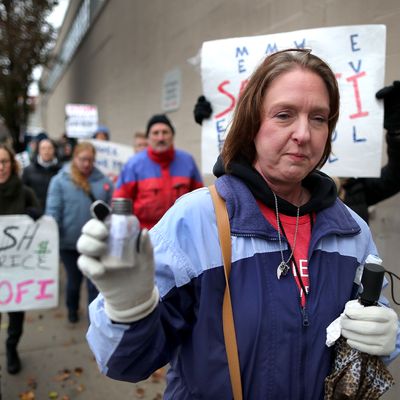
Twenty-one-year-old Jesimya David Scherer-Radcliff might still be alive if he could have afforded his insulin. KARE 11 reported on Sunday that the Minnesota man had been rationing the insulin he needed to treat his diabetes. “The cost of insulin is ridiculous,” Jesmiya’s father, David Radcliff, told the news station. “It is hard for me to even go in there and look at his casket. He is gone now.” Radcliff added, “I just think this country is backwards and I am a veteran. I have seen other countries and how they operate.”
Scherer-Radcliff’s death is not an isolated event. Annual insulin costs doubled between 2012 and 2016, a fact with a death toll attached to it. There’s no single force propelling insulin prices to newly dangerous heights, but the problem is exacerbated by the flaws of America’s heavily privatized health-care system. A lengthy piece in the Washington Post magazine suggested that pharmaceutical companies and pharmacy benefit managers (PBMs) like CVS Health share the blame. The pharmaceutical companies have raised prices in near lockstep. PBMs, as STAT explained in 2018, work with pharmaceutical companies to lower drug prices on behalf of insurance companies, but those discounts can end up increasing out-of-pocket costs. “Every time a PBM extracts a deeper discount, an insulin manufacturer has the incentive to take a price increase to quote ‘make themselves whole,’” health economist Rena Conti told the Post.
As insulin prices rise, patients go without. One study in the Journal of the American Medical Association, cited by the Guardian, found that around one in four patients with diabetes say they ration the medicine due to cost, but pharmaceutical companies show little interest in slashing prices back down to humane levels. Meanwhile, rationing can have dangerous consequences for patients who depend on insulin to survive. CNN reported in January that a teenager with diabetes had reduced his insulin intake by a third to try to save his underemployed parents hundreds of dollars every month. His parents only discovered the deception when a doctor informed them that the boy’s blood sugar was dangerously high. Others aren’t so fortunate. As I previously wrote for Intelligencer, Shane Boyle died in 2017 after he began rationing his insulin in order to cover the costs of his mother’s hospice care.
Scherer-Radcliff’s funeral was attended by Nicole Smith-Holt. According to the Post, her son, Alec, died of ketoacidosis less than a month after he aged out of his parents’ insurance plan. “My son and Jesy, they were murdered. They were killed by big Pharma. The cause of death should actually be on their death certificates, corporate greed,” she told KARE 11. “I want justice for all of their deaths.” In the same interview, Smith-Holt noted that Minnesota legislators had just failed to pass insulin legislation named for her son. Had the Alec Smith Emergency Insulin Act become law, patients could, according to a description in the MinnPost, fill insulin prescriptions regardless of their ability to pay. “Pharmacies could get reimbursed from a fund filled with some type of fee assessed to drug makers, similar to the proposals to tap opioid makers for the ill-effects of addiction,” MinnPost explained. The Duluth News Tribune reported on July 13 that legislators had failed to attach the act to an omnibus health and human-services bill. One Republican lawmaker told the News Tribune that the problem was a clerical error; at least one prominent activist, Quinn Nystrom, disagreed and attributed the failure to pharmaceutical lobbying.
Bills like the Alec Smith Emergency Insulin Act can help low-income patients. But a universal solution to the problem will take federal action, and that might not be forthcoming as long as Republicans control the Senate and the White House. Some federal lawmakers, however, have recently demonstrated interest in the problem. The House Oversight Committee and the Senate Finance Committee held hearings in January on insulin prices; in April, so did the House Committee on Energy and Commerce. And earlier this month, Senator Bernie Sanders announced that he would travel with a group of patients as they cross into Canada to purchase affordable insulin, highlighting his long-standing commitment to Medicare for All. If reform comes, it will come too late for Jesimya David Scherer-Radcliff. But it could save others.






























